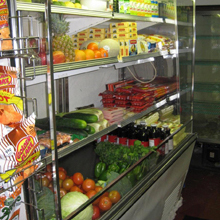SLHI Innovation Grant Awardee: International Rescue Committee
 If anyone ever doubted the ability of SLHI partners to dream up truly innovative community health initiatives, a quick look at the proposals received in response to the SLHI Innovation Grant RFP would definitely convince them otherwise.
If anyone ever doubted the ability of SLHI partners to dream up truly innovative community health initiatives, a quick look at the proposals received in response to the SLHI Innovation Grant RFP would definitely convince them otherwise.
The International Rescue Committee (IRC) in Phoenix, one of the four recipients of our Innovation Grant, caught our attention with its idea to address the problem of limited access to fresh fruits and vegetables in local low-income neighborhoods by connecting them to regional food producers. To do this, the IRC created a multifaceted Healthy Food Financing Initiative to drive the demand for, and supply of, fresh fruits and vegetables in target communities.
In the Maryvale, Canyon Corridor, and Golden Gate neighborhoods of Phoenix, where a large number of IRC clients live, the health of residents is compromised by limited access to fresh produce. Because the only stores in the area tend to be small corner stores, the IRC will connect 25 local farmers to at least 20 corner store owners, training both on how to provide fresh fruits and vegetables in smaller quantities. Because many of the refugees that the IRC serves come from agrarian backgrounds and are eager to launch farm businesses in the United States, the IRC already has a strong network of local farmers to draw on as resources in this effort.
Store owners in turn will be assisted in making the necessary infrastructure changes to their businesses to accommodate fresh produce sales, including re-designing their stores to accommodate fruits and vegetables, and receiving training on how to promote new produce items.
In order to help local residents get used to buying their produce from small stores in their neighborhoods, low-income shoppers will also receive incentives to purchase fresh fruits and vegetables at participating corner stores through the IRC Fresh Fund program. During a customer’s first 6 trips to the market, the Fresh Fund will match the use of SNAP or WIC up to $20– meaning customers can spend $20 but buy $40 of fresh produce.
The resulting hyper-local supply chain will create economic benefits for small business owners, community development benefits for neighborhoods, and especially health benefits for consumers as their diets improve. Such a win-win-win situation made the IRC’s proposal obviously deserving of an SLHI Innovation Grant, and we look forward to seeing the plan in action.
Read more about the IRC in Phoenix.